The Los Angeles, San Diego, San Jose and San Francisco crime families are known to criminal groups and crime-fighters alike as the Mickey Mouse Mafia. When in 1984 police in southern California launched an all-out drive to stop an attempt by organized crime to take over some $50-million-a-year bookmaking operations, they labeled the campaign “Operation Lightweight.” Los Angeles Police Chief Daryl Gates explained: “We feel the name is appropriate because organized crime is such a lightweight in Southern California.”
All the California crime families have been considered second rate—even Los Angeles when it was bossed by Jack Dragna, considered to have been California’s toughest mafioso. The Chicago mob, for instance, extended its influence in Hollywood, especially in movie rackets, regardless of the Los Angeles family’s feelings.
The New York mobs did the same, sending in Bugsy Siegel and others to extend their gambling empire into the West. This extension was Meyer Lansky’s idea and he got Lucky Luciano to warn Dragna not to interfere. Dragna acquiesced to Luciano’s orders even though Lucky was at the time in Dannemora prison. Clearly, a Luciano behind bars was more awesome than a Dragna on the loose.
  |
Another who showed contempt for the West Coast Mafia mobs was Jimmy “the Weasel” Fratianno, as near to an efficient killer as ever flourished in those climes. Of James Lanza, boss of the San Francisco family, Fratianno once told an underworld associate: “What has he ever done besides sell olive oil and insurance? Them guys in San Francisco and San Jose wouldn’t last two minutes if some real workers moved into their towns. Maybe we ought to move in and take over both towns. Knock off a couple of guys, scare the rest shitless.”
Fratianno considered doing just that but instead moved into a power vacuum in Los Angeles where the imprisonment of the then boss and underboss left Louie Tom Dragna, the deceased Jack’s nephew, in charge. Dragna was a weakling and Fratianno, brought in as acting boss, tried to put some backbone into L.A., pointing out that the other crime families had no respect for them and the more they failed to resist incursions, the more incursions would follow.
Fratianno’s plan never reached fruition. He aroused hostility among several important mobsters, especially in Chicago, and came under suspicion of being an informer. (He started feeding federal investigators bits of information, mainly because that allowed him to operate more freely without FBI interference since the agency did not maintain strict surveillance over those whom they thought were serving them.)
To this day, even though they represent one of the lushest areas of the country, the California mobs remain the weak sister of organized crime, truly the Mickey Mouse Mafia.
